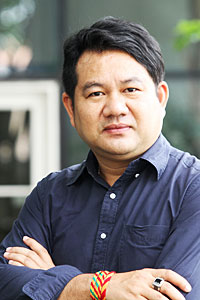
Despite promises of a general election next year, the prospects of democracy in Thailand will continue to look bleak so long as the military government's ban on political activity, including stopping parties from campaigning, remains in place.
The regime has announced plans to lift all restrictions on political activity by next month -- a move that will let other parties start holding early campaign events.
However, nobody knows exactly when this will happen -- if at all.
Only Prime Minister Prayut Chan-o-cha really holds the keys to power in this case.
The National Council for Peace and Order (NCPO) last December issued a Section 44 order giving new parties a one-month head start over existing ones in campaign preparations for the election.
Since March 1, new parties have been allowed to officially register, while existing parties were granted the go-ahead to register with the Election Commission later on April 1.
With the registration dates of both new and old parties having passed, it is high time that the NCPO restore the rights of all political parties to freely meet their members, canvassers and financiers without fear.
Parties should now be allowed to recruit new members or supporters, alongside other campaign activities.
The military regime must make clear its commitment to welcoming political activity to assure parties that fairness will be prevail in the next election, and that all will be able to compete on an even playing field, including the military-backed party.
As the election delay drags on, we have to consider what the consequences will be if the regime continues to ignore calls for political freedom.
The roadmap to national reconciliation will not be an easy one to navigate.
Even as we move closer to the election, the political climate is only bound to get more heated. Members of the opposition have repeatedly voiced their resistance to any form of compromise -- they want a general election next February as the prime minister has promised.
Besides dealing with demands for democracy in Thailand, the military government is under increasing pressure from international observers, keeping a close eye to see if they will follow through with their promise to let other parties carry out their campaigns.
Anti-regime protests led by the Democracy Restoration Group (DRG) and the New Democracy Movement (NDM) have made their message loud and clear to the military government.
They have announced a planned march to Government House on May 22.
The demonstrators known as "People who want an election" have organised an upcoming rally as a reminder that people have been waiting for years for the return of democracy -- since May 22, 2014, when Gen Prayut, then-army chief, staged a coup to seize power from the elected government led by the Pheu Thai Party.
On that day, Gen Prayut announced the coup on national television after seven months of struggling to ease tensions between the then-government with protestors from the now-defunct People's Democratic Reform Committee that sought to replace it.
Demonstrators plan to host an event to mark the four-year anniversary of the coup on May 22 this year.
They can be expected to call out the military and NCPO for exerting strict control over the freedom of expression and fundamental rights of the people over the past four years.
Even if the election goes ahead as promised, the military government's push to keep Gen Prayut in the prime minister's seat after the election through the pro-regime Pracharath Party may draw further criticism.
Deputy Prime Minister Somkid Jatusripitak, who oversees the nation's economic team, is believed to be behind the registration of this regime-backed party that took place on March 2 at the Election Commission.
Reports have emerged that Mr Somkid held talks with several former MPs who once served as cabinet ministers and worked with former prime minister Thaksin Shinawatra.
The conversation between Mr Somkid and those ex-MPs focused on the need for Gen Prayut to resume the premiership to prevent a repeat of the vicious political cycle of coups that has repeatedly unsettled the political system since the conception of Thai democracy.
Protestors are expected to call upon the government to hold elections as early as November this year, while demanding the military refrain from supporting Gen Prayut's government. They also aired these demands at an event at Thammasat University, Tha Prachan campus, last Saturday.
They further insisted the regime respond to their demands, threatening to hold another rally to up pressure despite warnings from the Royal Thai Police (RTP) and the National Security Council (NSC).
RTP deputy chief Srivara Ransibrahmanakul and NSC chief Wanlop Rugsanaoh have warned pro-election campaigners against exercising violence and vowed to take legal action against those who may pose violent threats.
They said security officers are assessing the situation and will help prevent any so-called "third hands" from triggering violence.

Anucha Charoenpo is News Editor, Bangkok Post.
They also pledged to adhere to the Public Gathering Act when dealing with the demonstrators.
In my opinion, the military regime has the power to deal with the protestors as they like. If the demonstrators decide to resort to violence, the state has the means to clamp down accordingly.
However, as long as the rally is peaceful, the junta should let it go off without a hitch.
This could lead to a positive outcome, with more people feeling encouraged to voice their support for a free and fair election.
Whatever the junta does, I hope they will take steps to ease tensions ahead of the next vote -- whenever that may come.
